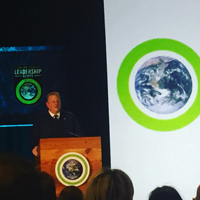
On Sunday, November 23, the International Olympic Committee (IOC) held a summit to discuss sports and the environment and the kick-off of the Sochi Games in February, 2014. Two of the key topics centered around bringing young people into sports and the role of sustainability.
As we’ve noted before about the Olympics, they are not known for capturing the excitement of a new youth culture marketplace and have often selected sports that are less interesting to young people than ever before. Even with the advent of the Youth Olympic Games, more young people in the U.S., for example, would rather watch the Dew Tour or X Games than the Youth Games. In many regards, the Olympics have a long way to go.
However their other meeting topic regarding sustainability and the environment is moving forward at a faster pace and will change requirements for host cities, sponsors, and sports in the Olympics.
IOC President Thomas BACH and other leaders from sectors such as the environment, academics, sports, and government discussed the Olympics under the theme “Changing Today for a Better Tomorrow.” The concept was to create a sustainable development landscape following Rio+20, sustainable-development legacies of previous and future Olympic Games, and the role of the UN system.
Keynote speakers included the first woman from Saudi Arabia to scale Mount Everest, Raha Moharrak, and United Nations Environment Programme (UNEP) Patron of the Oceans Lewis Pugh, who was the first person to complete a long-distance swim in every ocean of the world. On the occasion of the opening ceremony of the three-day conference, Bach called on delegates to continue working to bring about a paradigm shift for environmental protection and sustainable development.
“Sport has long been well aware of this responsibility, and is moving forward with many like-minded partners by setting a good example,” he said. “The Olympic Movement has already shown the international community how sport can make a tangible contribution to reducing environmental impacts. We are helping in the search for sustainable solutions by providing highly practical guidelines and strategies, for implementation globally, but also locally.”
Five continental winners of the 3rd IOC Sport and Environment Awards were also announced and recognized for their outstanding initiatives in the field of environment and sustainable sport:
Africa: Kenya Rowing and Canoe Association (Tudor Water Sports Marina), Kenya
Americas: Clean Air Champions (CAC), Canada
Asia: Sport and Environment Commission, National Olympic Committee of Iran (Tochal Mountain Park), Iran
Europe: Sport and Environment Commission, National Olympic Committee of Serbia (Ada Ciganlija Lake), Serbia
Oceania: Sustainable Coastlines and Papua New Guinea Olympic Committee Inc (Go Green: Love Your Coast), Papua New Guinea
The biennial World Conference on Sport and the Environment is one of the IOC’s key advocacy initiatives in the field of the environment. For the Sochi 2014 Olympic Games, sustainability is now one of the key considerations. Moving forward, cities that submit proposals will also have to have such issues in place towards gaining support for the Olympics. This also includes plans from sponsors.


